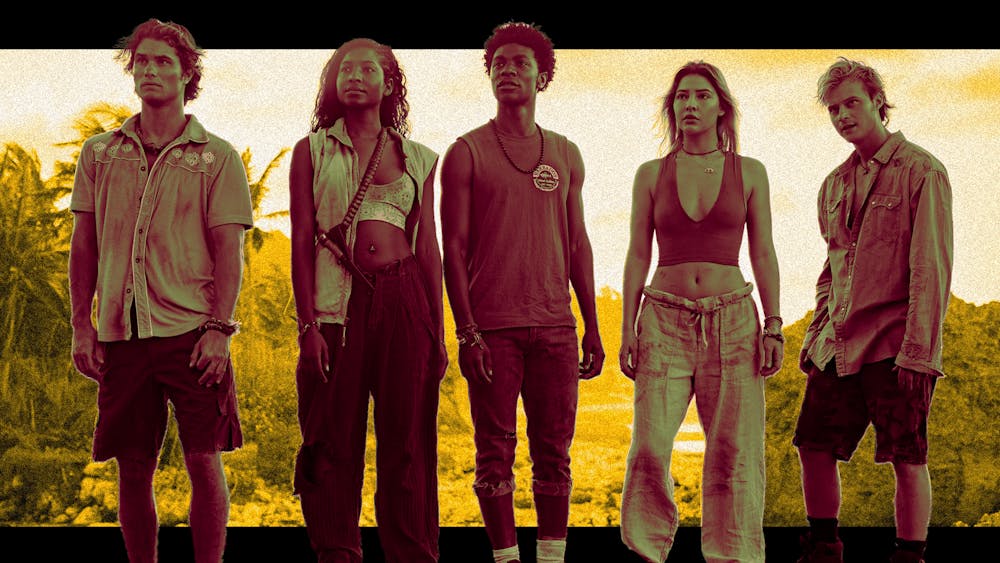After a hectic week of classes, I’m looking forward to one thing. Windows closed, dorm door locked, and computer brightness all the way down, I open up an incognito tab and navigate to my secret guilty pleasure: Outer Banks.
Lauded as “Scooby–doo meets swearing” by critics, the 2020 teen drama has faced plenty of criticism for its cliched love triangles, over–the–top characters, and preposterous plot lines (Fighting off an alligator attack bare–handed? Yes, please!). But there’s more to Outer Banks than meets the eye. Despite being labeled a trashy teen drama, Outer Banks is chock–full of social and political themes—if you can look away from the fact no one ever wears a shirt.
The main premise of the show is explicitly defined as class conflict, opening with ongoing tensions on the island that is divided between the upper–class Kooks and the working–class Pogues who serve them. For a Marxist, it's a classic bourgeoisie–proletariat divide. For the kids growing up on the island, it means everything: who your friends are, who you date, and most, of all, who you hate. As the show’s heartthrob J.J. says, “It’s Pogues for life.” Simply put, your class defines who you are.
The three seasons of the show follow a close–knit friend group of Pogues hunting for hidden treasure among a backdrop of cinematic sunsets and teenage drama. All the while, the Pogues fight against the Kooks who likewise seek to claim the untold riches and gold. Class theory is transformed into praxis as the Pogues attempt to undermine the long–standing power imbalance through illicit plans, risky escapades, and ultimately even converting the “Kook Queen” into one of their own. But revolution is no easy feat as the upper class fights to maintain their position of power—utilizing law enforcement, money, and even murder to their advantage. As Marx would say, “In a word, oppressor and oppressed, stood in constant opposition to one another, carried on an uninterrupted, now hidden, now open fight, a fight that each time ended, either in a revolutionary reconstitution of society at large, or in the common ruin of the contending classes.”
However, despite the long–seated division between Kooks and Pogues, both are dangerously tempted by the promise of wealth. Kooks and Pogues alike sacrifice their family, their education, and even their lives for the glitter of gold and the lure of fame. The lengths the characters go to for their treasure might seem preposterous, but when compared to our own lives, it’s not entirely unbelievable. After all, if we’re willing to give up the majority of our days, sacrifice our health, and spend life stuck behind a desk in hopes of a six–figure salary, is it any surprise that someone would dedicate their summer for millions of dollars of treasure? They’re even having fun on the beach, too.
Season three, however, proposes an alternative vision to the capitalist quest for treasure. Cast away, the crew creates a utopian island called “Poguelandia," where they spend their days hunting for their bare necessities, pooling together their shared resources, and then relaxing on the beach. Ah, the anarchist’s dream. While many of the characters explicitly state that they would rather live out their lives on the island, they are ultimately pulled away from their newfound utopia and thrown back into the tumult of the treasure hunt. As the narrative continues, one is forced to ask, however, if this quest is really the answer. Or did the Pogues already find their real treasure in their utopian experiment outside the realms of society? While anarchist philosopher Peter Kropotkin might have an answer, for the sake of Season Four, the treasure hunt must continue.
If you haven’t done your reading for your political science class this week, just treat yourself to an episode of Outer Banks, because from a critical eye, they’re practically the same. After all, who’s to say a show can’t be both trashy and classy?







